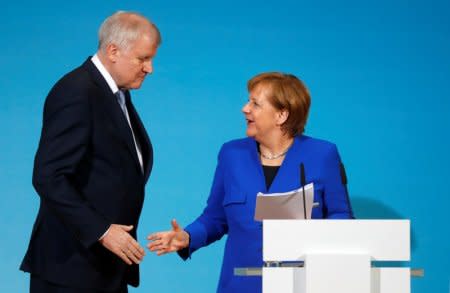Bavarian ally dodges question of whether Merkel would lead in new vote

Thomson Reuters
BERLIN (Reuters) - German Chancellor Angela Merkel's top Bavarian ally, Horst Seehofer, pointedly dodged a question about whether Merkel would be the conservative candidate if she fails to build a coalition and a new election is called.
In an interview with Bild newspaper published on Thursday, Seehofer praised Merkel and said he had no doubt about her desire to continue leading.
But when asked if Merkel would be the natural candidate to lead the conservatives in a new election, Seehofer said: "I don't want new elections, and he who doesn't want new elections doesn't have to think about who would be the top candidate."
Seehofer leads the CSU, sister party in Germany's largest state Bavaria to Merkel's CDU.
Weakened by her party's losses in the September election, Merkel is counting on the still-divided center-left Social Democrats (SPD) to endorse formal coalition talks on Sunday as her best shot at securing a fourth term.
If that fails, she would most likely have to attempt to form the first minority government in Germany's post-war era, or face a new election.
The conservatives and the SPD reached agreement Friday on a blueprint for renewing the "grand coalition" that has ruled Germany from since 2013, but an SPD congress must first give its blessing.
Renewing the grand coalition is unpopular with many SPD activists, who blame the arrangement for their worst electoral showing since World War Two.
Europe's pre-eminent leader for more than 12 years, Merkel's star is waning as she pays for her 2015 decision to open Germany's borders to more than a million asylum seekers, a move that saw her party bleed support to the far-right.
Seehofer, who had backed Merkel after months of sniping about the migration issue, said renewing the grand coalition would result in "four good years for Germany."
He said Merkel proved her mettle in a week of intense exploratory talks with the SPD.
"Whoever saw Angela Merkel during the negotiations has no concerns about her fitness or ability to lead politically and conceptually," he told the mass-circulation Bild newspaper.
Seehofer also emerged from the elections weakened, and his party last month nominated the more right-wing Bavarian state finance minister as its candidate for premier in a state election this autumn.
The normally unflappable Merkel reportedly became angry during the latest exploratory talks after Jens Spahn, a leading member of her CDU party and possible Merkel successor, questioned the ability to sell a new grand coalition, the Berliner Zeitung newspaper reported.
"It looks like 2013 but more expensive," the paper quoted Spahn as saying during the last evening of marathon talks.
"That really made her angry," a conservative source told the newspaper, noting that the incident marked an unusual moment for the pragmatic leader.
(Reporting by Andrea Shalal; Editing by Peter Graff)
See Also:

 Yahoo News
Yahoo News 
